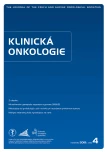-
Medical journals
- Career
Carcinoma of Unknown Primary in Head and Neck Region
Authors: Uhliarová Barbora 1; Navrátilová Marcela 1; Čalkovský Vladimír 2; Hajtman Andrej 2
Authors‘ workplace: Oddelenie otorinolaryngológie FNsP FD Roosevelta, Banská Bystrica 1; Klinika otorinolaryngológie a chirurgie hlavy a krku, UK JLF a UNM Martin 2
Published in: Klin Onkol 2018; 31(4): 277-281
Category: Original Articles
doi: https://doi.org/10.14735/amko2018277Overview
Introduction:
Carcinoma of unknown primary (CUP) in head and neck region is diagnosed in 5% of patients with malignant tumour of head and neck. In the management of patients with CUP, complex investigation to diagnose the occult tumour is always necessary. Detection of origin allows targeted specific treatment that significantly improves the prognosis of the disease.Material and methods:
Retrospective analysis of patients treated at the Department of Otorhinolaryngology and Head and Neck Surgery of the UK JLF and UNM in Martin between January 2012 until September 2017 for CUP in head and neck region. Diagnostic procedure and success of primary tumour detection were evaluated.Results:
In study group, there were 40 patients with average age 59.4 ± 1.5 years (35–78 years). CT scan and panendoscopic examination in general anaesthesia were performed in all patients. Ipsilateral tonsillectomy (TE) was performed in 34 patients (80%). For the remaining 6 patients, TE was not indicated – 2 found originally in the panendoscopic examination and in 4 TE was performed in the past. Blinded samples from the nasopharynx, the base of the tongue and the pyriform recess were taken in 38 patients (95%). PET/CT screening was indicated in 12 patients (30%). The primary tumour did not detect the primary tumour in any of them. Primary tumour was diagnosed in 21 cases (52.5%). In 16 patients (40%), the primary tumour was found in the upper aerodigestive tract, in 5 patients (12.5%) the primary tumour was located outside the ENT region. The primary tumour was not identified in 19 cases (47.5%). Conclusion: Despite the modern imaging and endoscopic methods, the primary tumour cannot always be identified.Keywords:
metastasis into cervical lymph nodes – carcinoma of unknown primary – diagnosis – PET/CT – panendoscopyThe authors declare they have no potential confl icts of interest concerning drugs, products, or services used in the study.
The Editorial Board declares that the manuscript met the ICMJE recommendation for biomedical papers.
Submitted: 3. 1. 2018
Accepted: 18. 6. 2018
Sources
1. Gočárová K, Špánik S. Zriedkavé nádory hlavy a krku. Onkológia 2013; 8 (2): 78–82.
2. Kozhanov LG, Shatskaia NK, Luchikhin LA. Principles of early diagnosis of malignant neoplasms in ENT organs. Vestn Otorinolaringol 2008; 5 : 7–10.
3. Čelakovský P, Plzák J, Betka J (eds). Krční metastázy. Tobiáš 2012 : 328.
4. Chernock RD, Lewis JS. Approach to metastatic carcinoma of unknown primary in the head and neck: squamous cell carcinoma and beyond. Head Neck Pathol 2015; 9 (1): 6–15. doi: 10.1007/s12105-015-0616-2.
5. Zdražil B, Profant M, Povinec P. Prínos PET/CT vyšetrenia do diagnostiky neznámeho primárneho tumoru s metastázovaním do krčných lymfatických uzlín – naše skúsenosti. Otorinolaryng a Foniat 2012; 61 (1): 53–56.
6. Issing WJ, Taleban B, Tauber S. Diagnosis and management of carcinoma of unknown primary in the head and neck. Eur Arch Otorhinolaryngol 2003; 260 (8): 436–443. doi: 10.1007/s00405-003-0585-z.
7. Binková H, Horáková Z, Kostřica R et al. Narůstající incidence HPV pozitivních orofaryngeálních karcinomů. Otorinolaryng a Foniat 2015; 64 (4): 205–212.
8. Boscolo-Rizzo P, Schroeder L, Romeo S et al. The prevalence of human papillomavirus in squamous cell carcinoma of unknownprimary site metastatic to neck lymph nodes: a systematic review. Clin Exp Metastasis 2015; 32 (8): 835–845. doi: 10.1007/s10585-015-9744-z.
9. Švajdler M, Laco J, Ondič O et al. HPV-asociované karcinómy hlavy a krku: Aktualizácia poznatkov a odporúčania pre prax. Cesk slov Patol 2016; 52 (3): 130–138.
10. Uhliarová B, Švec M. Využitie PET/CT v otorinolaryngológii. Slov lek 2017; 9-10 : 18-24.
11. Abouzied MM, Fathala A, Alsugair A et al. Role of fluorodeoxyglucose-positron emission tomography/ computed tomography in the evaluation of head and neck carcinoma. World J Nucl Med 2017; 16 (4): 257–265. doi: 10.4103/wjnm.WJNM_40_17.
12. Mackenzie K, Watson M, Jankowska P et al. Investigation and management of the unknown primary with metastatic neck disease: United Kingdom National Multidisciplinary Guidelines. J Laryngol Otol 2016; 130 (Suppl 2): S170–S175. doi: 10.1017/S0022215116000591.
13. Byrd JK, Smith KJ, de Almeida JR et al. Transoral robotic surgery and the unknown primary: a cost-effectiveness analysis. Otolaryngol Head Neck Surg 2014; 150 (6): 976–982. doi: 10.1177/0194599814525746.
14. Theodoraki MN, Veit JA, Hoffmann TK et al. Synchronous bilateral tonsil carcinoma: case presentation and review of the literature. Infect Agent Cancer 2017; 12 : 38. doi: 10.1186/s13027-017-0146-5.
Labels
Paediatric clinical oncology Surgery Clinical oncology
Article was published inClinical Oncology

2018 Issue 4-
All articles in this issue
- Use of Salivary MicroRNAs for Diagnosis of Solid Cancers
- Monoclonal Gammopathy of Undetermined Significance (MGUS)Monoclonal Gammopathy of Undetermined Significance (MGUS)
- Carcinoma of Unknown Primary in Head and Neck Region
- Occurrence and Antibiotic Resistance of Enterobacteriaceae in Acute Leukemia Patients
- Malignant Melanomas of the Skin Arising on the Feet
- Use of Fludarabine for the Treatment of Indolent Lymphoma with Chylothorax
- Expression Analysis of OIP5-AS1 in Non-Small Cell Lung Cancer
- A Combined Bioinformatics and Literature Based Approach for Identification of Long Non-coding RNAs That Modulate Vitamin D Receptor Signaling in Breast Cancer
- Metastases of a Breast Cancer to Skull Base
- Primary Branchiogenic Carcinoma
- The Therapeutic Effects of Specific CDK4/6-inhibitors in Treating HR-positive, HER2-negative Advanced Breast Cancer
- Clinical Oncology
- Journal archive
- Current issue
- Online only
- About the journal
Most read in this issue- Monoclonal Gammopathy of Undetermined Significance (MGUS)Monoclonal Gammopathy of Undetermined Significance (MGUS)
- Carcinoma of Unknown Primary in Head and Neck Region
- Occurrence and Antibiotic Resistance of Enterobacteriaceae in Acute Leukemia Patients
- Use of Salivary MicroRNAs for Diagnosis of Solid Cancers
Login#ADS_BOTTOM_SCRIPTS#Forgotten passwordEnter the email address that you registered with. We will send you instructions on how to set a new password.
- Career

